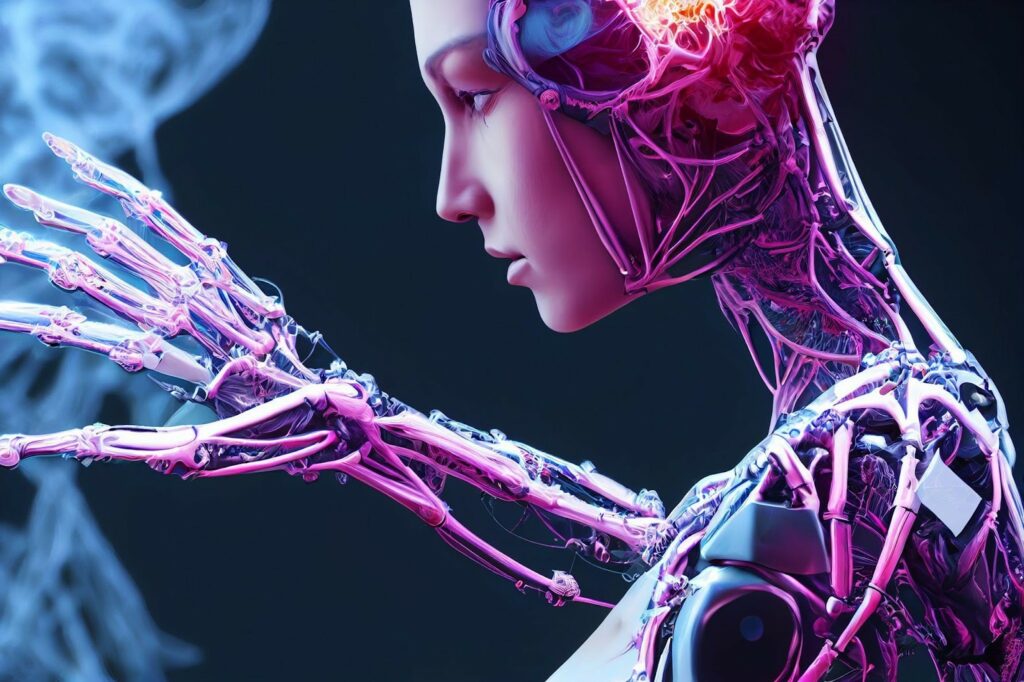Google now responds to its search queries using AI-generated ‘snapshots’. Have you ever wondered how Google generative AI could transform your online search experience?
What implications could this have for small and medium-sized businesses?
Has Google essentially captured all of our organic traffic?
In this blog, we’ll delve into the exciting possibilities and potential implications of how generative AI could shape the future of search results, offering insights into how this innovative technology may enhance our online interactions.
So, let’s roll up our sleeves and jump into action.
How Will Google’s Generative AI Revolutionize Search Result Experience?

Like previous changes introduced by Google, this emerging development will be something online marketers will adjust to. While SGE is still in its experimental phase, it will impact digital marketing in several ways.
Exceptional, Authoritative Content Takes Center Stage
In digital marketing, creating unique and insightful content is crucial for success. With Structured Generative Engines (SGE) on the rise, it’s even more important to produce content that truly connects with audiences and offers real value. While AI can generate content, it often lacks the depth and exclusive insights that come from human experiences.
Presently, AI can’t give detailed observations like humans can. While SGE summaries make information shorter, they might not be enough for users who want more details. So, if users want deeper insights, that content has to show up well in regular search results.
With SGE showing fewer organic results, they often come after paid ads and AI-generated summaries. This makes the competition in organic search tougher.
Understanding what people search for and what they want might be more crucial than just using keywords. Also, getting information from your own sources and experts can be really useful.
When creating content, it’s a good idea to think about how AI algorithms work and try to make your content special and valuable in a way that it becomes difficult to replicate.
Conversational Search is On the Rise
Back in the early days of search engines, people had to learn special techniques, which included using words like “and” or “or” to help find what they wanted.
For example, if you wanted to find information about healthy recipes, you might type in “healthy AND recipes.” These techniques were helpful, but they’re not as necessary now.
Before the introduction of generative AI, we usually use short phrases or keywords, not full sentences, to search. But with voice search and new search technology, that’s starting to change. Now, you can just talk to your phone or computer like you’re talking to a friend.
For example, Instead of searching for “best Italian restaurants near me,” you could simply ask, “Where can I find authentic Italian cuisine?” If you have specific dietary preferences, you could add, “Are there any Italian restaurants with gluten-free options?”
This conversational approach allows for a more natural and tailored search experience, enabling users to refine their queries until they discover precisely what they’re craving.
So, digital marketers should be ready for this transition. They need to think about how people will ask questions in a conversational way and make sure their content can answer those questions.
Instead of just focusing on keywords, they’ll need to create content that feels like having a real conversation.
Diversified Content Selection Increases Visibility in Search Results
When digital marketers discover a successful content format, they are naturally inclined toward it and keep their focus solely on it. After all, if it’s effective, why change?
However, this approach may not align well with Google’s Search Generative AI. AI algorithms tend to pull results from a range of sources, encompassing various content formats.
By incorporating a mix of blog posts, videos, case studies, podcasts, and infographics, a brand can enrich its content formats and increase its chances of visibility in search results.
This approach caters to different segments of the target market, each with distinct preferences for consuming online content.
The Rise of Google Generative AI Spells Trouble for Organic Search Traffic
Brace yourself for a revolution in organic search, as Generative AI paves the way for a new era of tailored results for each user. Consider a scenario where a user seeks information on “home workout routines” through a generative AI-powered search engine.
The AI algorithm doesn’t just give generic results. Instead, it looks closely at the user’s search history, location, and preferences. It considers things like fitness levels, available equipment, and preferred exercise styles.
Utilizing this wealth of data, the AI can craft highly personalized workout recommendations tailored precisely to each user’s specific needs and circumstances.
For example, it might suggest low-impact exercises for individuals dealing with knee issues or bodyweight workouts for those lacking access to gym equipment.
Furthermore, Generative AI can create more than just text-based search results. it can also create a range of multimedia content such as instructional videos, interactive guides, and visually appealing infographics. This variety helps different people learn better and make their searches more engaging.
For example, instead of just showing text for workout routines, the AI could make videos with step-by-step instructions. This step-by-step guide will demonstrate each exercise with detailed instructions and visual demonstrations. This way, people can understand better and stay motivated while exercising.
Voice-Powered Search and Voice-Activated Features
Digital assistants like Siri on iOS and Google Voice Assistant have significantly simplified tasks for millions worldwide, offering seamless assistance through voice commands such as “Hey Google” or “Hey Siri.”
Generative AI is changing how digital assistants work, making them smarter and more personalized.
These new digital assistants don’t just follow voice commands; they understand your preferences and can help with tasks.
Imagine having an assistant that knows your daily routines and interests. With generative AI, it can do more than just respond to your voice; it can anticipate what you need.
For example, when planning a trip, this AI-powered assistant can do more than just book flights or hotels. It can look through your emails and calendars to suggest personalized travel plans. It might even recommend nearby places to visit or eat based on your likes.
Plus, it can help with other tasks, like making a grocery list for your trip or sending messages to your loved ones.
Language Translation and Localization
Generative AI helps translate languages by looking at a lot of different texts in two languages. It learns how words and phrases match up between the languages so it can make accurate translations that make sense.
For example, if a website is in English but wants to reach Spanish-speaking customers, the AI can translate the content into Spanish. This helps people understand the website and make decisions in their own language.
Localization is more than just translation. It also considers cultural differences, like what’s popular in different places. Generative AI helps with this by making sure the translations fit with the culture of the people reading them.
For instance, if a website is targeting customers in the US during the summer, the AI might use images of beaches and bright colors. The messages might talk about outdoor fun and vacations, which are things Americans like to do in the summer.
Using AI for translation and cultural adaptation helps businesses reach people all over the world, show off their products to more people, and build stronger connections with different cultures.
Now that we’ve explored how Google’s generative AI search influences search results let’s redirect our attention to the impact it has in the areas of digital marketing.
The Impact Of Google Generative AI Search on Different Areas of Digital Marketing

Let’s understand how Generative AI can transform different areas of digital marketing and how businesses can make use if this innovative technology to grow their business.
Search Engine Optimization (SEO)
Generative AI is going to revolutionize the SEO industry, but perhaps not in the way you think. Yes, your day-to-day job as an SEO will look different in a few years. But are bots going to replace you? “Absolutely not”
Generative AI will indeed streamline certain aspects of SEO, such as content creation and optimization. It will enable more efficient keyword research, content generation, and even personalized user experiences.
In SEO strategy development, data interpretation, and decision-making, human expertise remains indispensable. SEO professionals possess critical analytical skills to interpret trends, analyze data, and tailor strategies to meet specific business objectives and audience needs.
Moreover, human creativity and instincts are crucial in coming up with ideas for content, engaging users, and adjusting to changes in search algorithms and how users behave online.
In short, although generative AI helps make certain SEO tasks easier and more effective, human creativity and strategic planning are still vital for tackling the complexities of SEO and achieving meaningful results for businesses.
Google Ads
Ever wonder if Google Ads will soon outsmart us all with generative AI? Well, it’s not about beating us at our game but rather reshaping the playing field. Generative AI is a fresh minimally viable product in online advertising, set to transform how Google Ads operates.
Imagine ads so tailored that they feel exclusively crafted for each viewer. This is the transformative power of generative AI in Google Ads. It transcends mere keyword targeting, delving into creating ads that deeply resonate with individual users.
Generative AI enables ads to dynamically adjust to users’ preferences, interests, and behaviors, thereby enhancing the relevance and engagement of advertising content.
Moreover, it introduces the concept of automated ad generation, eliminating the need for manual adjustments and testing. With AI’s capability to produce multiple ad variations automatically, valuable time and resources are saved while ensuring ad relevance.
Yet, its impact extends further. Generative AI helps understand how users behave, allowing for smarter ad targeting and bidding strategies. It’s akin to having an exceptionally intelligent assistant that discerns precisely what your audience desires and how to fulfill those needs.
Even though generative AI might seem new, it could change the future of Google Ads, making advertising smarter, more personalized, and more effective.
Understanding how generative AI affects digital marketing, let’s embark on a journey to uncover the forthcoming advancements in this transformative technology.
The Future of Generative AI

Generative AI represents a remarkable advancement in the field of artificial intelligence. It leverages sophisticated machine-learning techniques to generate innovative content across various domains.
As this technology continues to evolve, it holds the promise of expediting the implementation of AI. It also revolutionizes the way we interact with technology.
Moreover, by prioritizing ethical considerations and responsible development practices, we can harness the full potential of generative AI. This enables us to address societal challenges and create positive impacts across diverse industries.
Final Thoughts
Generative AI offers exciting possibilities alongside potential challenges. Moreover, there’s a growing focus on treating generative AI as a specialized tool rather than a universal solution. Companies need to appreciate its diverse applications beyond basic functions. Understanding the basics of generative AI and preparing for future hurdles is crucial.
Stay a step ahead in the race for market dominance with knowledgeable insights gained from LeanSummits, ensuring your business excels in the ever-evolving landscape of search marketing.



